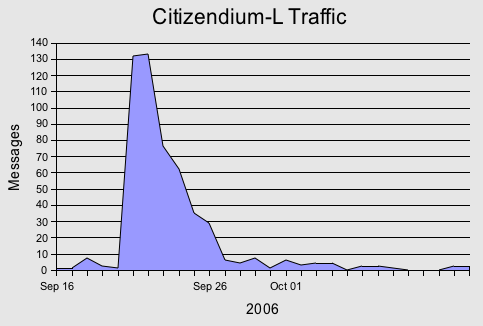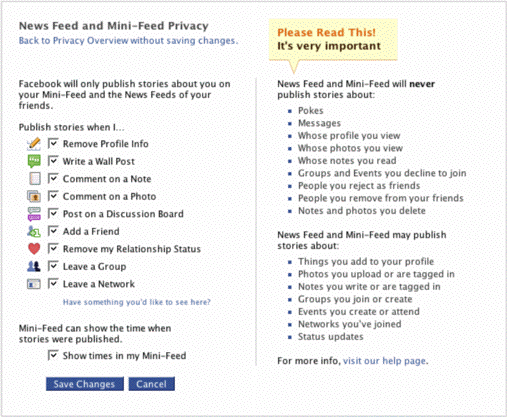Network effects are very powerful. They are also very hard to come by, by definition, as most of the time you’re not the one enjoying them. Network effects are blessed upon those who are popular, have a lot of attention being paid to them, and/or are active participants in their own success. They feed themselves and are powered by many people paying attention and taking action on behalf of your product or your idea.
Citizendium seemed to be headed down that path. Within a couple days of an initial announcement, hundreds of people were paying attention to this idea of an expert-led, expert-moderated compendium of the world’s knowledge. It was to be what many have been clamoring for since Wikipedia‘s public “problems” have become more and more a part of our collective understanding (I’m not convinced Wikipedia’s “problems” are not simply “features” that need a better interface). A new wiki that would withstand the fly-by editors, spam and possible subtle fact-shifting that could be present in any article at the old and tired Wikipedia.
Larry Sanger was onto something. The Citizendium project obviously touched a nerve among the masses and fostered a flaring-up of discussion by providing a public square where like minds could share opinions, concerns, and plans for improving the status quo. There really was a rallying of the troops. Hundreds of messages in the first few days.
Description Main discussion list for Citizendium, an expert-friendly fork of the Wikipedia project. Citizendium was founded by Larry Sanger.
And then it died.
Or rather, its momentum was killed – by the very person who started it only a few days before.
What’s interesting here is that one of the reasons for announcing an 8-message/day limit for the mailing list was the crushing weight of too many messages.
I confess that, while I’m truly delighted with the activity on this list, and while I don’t mean to criticize anyone, I’m increasingly frustrated with the way things are going on the list. The process is more to blame than any specific person’s abilities or carelessness. There have been many 100% signal posts, of course, but overall the signal-to-noise ratio here has never been very high.
I think everyone can agree that there has been just too much happening on the list to be of the best possible use to anyone, myself included. It’s like trying to make a civilized assembly out of an enormous roomful of extremely intelligent and opinionated people, who are constantly talking over each other.
However, there were really only about four days after the opening of the list where the message count was truly staggering. After that, it was already tapering off. People had mostly said what they came to say, and the discussion was shaping up nicely both in quality and quantity. The announcement on Sept 26 by Larry Sanger relegated the “Main discussion list for Citizendium” to basically an announcement list for Larry Sanger to share whatever it is that Larry Sanger seems to have decided in the last few hours.
And this is by no means a complaint or a finding of fault.
I am simply surprised by the move – first, because there was a very interesting and lively discussion happening where there was not one before, and second, because someone as visible and connected as Larry is in this world of many-eyes-make-good could so abruptly shut down such a viable branch of conversation.
Now, in fairness, within the same message announcing the 8-message/day limit there was the announcement of an online forum where the discussion could be moved. A quick look at the forum confirms there are currently “76 members, 624 posts” in the 17 days or so since the announcment. So the discussion has continued – just not in my inbox. And out of sight of the hundreds that were part of that initial flurry of a few days.
I dare suggest that forcing people who have other things to do to come to Yet Another Forum just to keep up with the discussion, is not the best idea.
We may look back on this post and laugh at my observations, my base analysis. We may wonder how I could have missed the obvious genius of Sanger’s calculated move. But I’m not convinced that’s going to happen.
I would love for Citizendium to work. I would love to know that there is a vetted place where good information is free and dependable and available to everyone. But I see too many edge cases where the two cultures, free/open/allcomers and topdown/authority/expertiseonly, will collide in Citizendium’s current model.
I still stand with Clay at this point in time. It will collapse under its own administrative weight. Experts are too expensive/hard to vet in the proposed self-identified model and the experts will not play along anyways because there is not an incentive for them to play along.
All that said – a most excellent dissection of what is happening with the bigger picture of Citizendium is posted by Mike Johnson at Modern Dragons. It is highly recommended if you want to know more.
I believe that this last issue, motivation, is one of the larger black clouds over Citizendium. My major concerns are as follows:
1. How many academics can be expected to put large amounts of time and effort into something which doesn’t (at this point) help their chances of getting tenure, nor their academic prestige?
2. Doing original research is one of the most appealing parts of being an academic, and there’s no place for original research in an encyclopedia. Might academics tend to be busy with their own projects, curiosities, and visions?
3. Do enough experts have enough collective drive to build an encyclopedia? Nobody thought amateurs could write an encyclopedia, and that may have been a significant part of why Wikipedia took off. Experts, on the other hand, know they can write an encyclopedia in principle– all encyclopedias were written by experts before Wikipedia- and don’t tend to be as hungry for validation as amateurs.
Tags: citizendium - momentum - PowerOfMany - sanger



